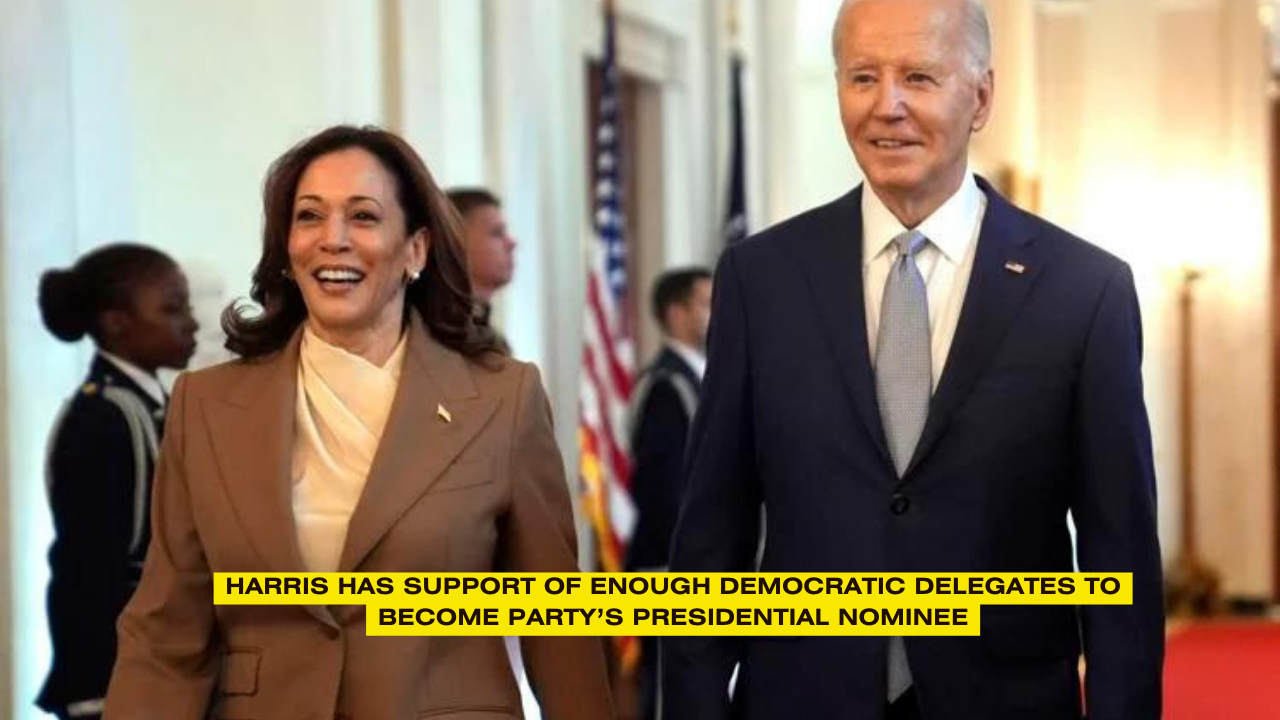
Harris Has Support of Enough Democratic Delegates to Become Party’s Presidential Nominee
In a groundbreaking development, U.S. Vice President Kamala Harris has secured the support of a majority of Democratic delegates, positioning her as the party’s presidential nominee for the upcoming election. This significant political milestone is a testament to her robust campaign strategy and the widespread approval of her leadership within the Democratic Party. The recent Associated Press (AP) survey highlights this pivotal moment in U.S. politics, setting the stage for a historic election battle. Harris
Kamala Harris: A Historic Nominee
Kamala Harris’s journey to becoming the Democratic nominee is historic for multiple reasons. As the first woman of South Asian and African American descent to be nominated for the presidency by a major party, Harris’s candidacy represents a significant step forward in American political history. Her extensive career in public service, including her roles as California’s Attorney General and U.S. Senator, has equipped her with the experience and insight necessary to lead the nation.
Support from Democratic Delegates
According to the AP survey, Harris has garnered the support of enough delegates to secure the nomination. This widespread backing reflects her strong connections within the party and her ability to unite different factions. Harris’s policies on healthcare, climate change, and social justice have resonated deeply with delegates, many of whom see her as the best candidate to continue the progressive legacy of the Democratic Party.
Key Factors Behind Delegate Support
Policy Alignment
Harris’s policy proposals have been crucial in securing delegate support. Her stance on expanding access to healthcare, combating climate change, and ensuring economic equity aligns closely with the values of the Democratic base. Harris’s commitment to addressing systemic racism and reforming the criminal justice system has also been a significant factor in winning over delegates.
Campaign Strategy
Harris’s campaign strategy has been meticulously crafted to engage with a diverse electorate. Her grassroots campaign efforts, coupled with a strong digital presence, have enabled her to connect with voters and delegates across the country. Harris’s ability to articulate a clear vision for the future and her emphasis on unity and inclusivity have been pivotal in gaining delegate support.
Endorsements and Alliances
Endorsements from key figures within the Democratic Party have played a critical role in Harris’s rise. Influential leaders and former rivals have thrown their weight behind Harris, recognizing her potential to galvanize the party and lead a successful campaign against the Republican nominee. These endorsements have not only boosted her credibility but have also helped consolidate support among delegates.
The Path to the General Election
With the nomination secured, Harris’s campaign is now focused on the general election. The upcoming months will be crucial as she prepares to face the Republican candidate in a contest that promises to be fiercely competitive. Harris’s campaign will likely emphasize her comprehensive policy platform, her track record of public service, and her ability to represent the diverse voices of America.
Building a Broad Coalition
To win the general election, Harris will need to build a broad coalition that extends beyond the Democratic base. This includes reaching out to independent voters and moderate Republicans who are disillusioned with the current administration. Harris’s ability to connect with a wide range of voters will be critical in securing a victory in November.
Addressing Key Issues
Key issues such as the economy, healthcare, and national security will be at the forefront of Harris’s campaign. Her detailed policy proposals and her ability to effectively communicate her vision for America will be essential in persuading undecided voters. Harris’s focus on uniting the country and addressing the pressing challenges facing the nation will be central themes of her campaign.
Debate Preparation
Debates will be a significant aspect of the general election campaign. Harris’s experience as a former prosecutor and her sharp debating skills will be invaluable as she prepares to face her opponent on the national stage. These debates will provide an opportunity for Harris to showcase her policy expertise and her readiness to lead the country.
The Significance of Harris’s Nomination
Kamala Harris’s nomination as the Democratic presidential candidate is a landmark moment in American politics. It reflects the changing dynamics within the Democratic Party and the broader political landscape. Harris’s candidacy symbolizes progress and the ongoing fight for equality and justice in the United States.
Impact on Voter Turnout
Harris’s historic nomination is expected to have a positive impact on voter turnout, particularly among minority communities and young voters. Her candidacy has the potential to inspire and mobilize a new generation of voters who are eager to see representation and leadership that reflects the diversity of the nation.
Global Implications
Harris’s nomination also has significant global implications. As a candidate with a strong international profile, Harris is expected to bring a renewed focus on diplomacy and global cooperation. Her approach to foreign policy will likely emphasize building alliances and addressing global challenges such as climate change and international security.
Conclusion
Kamala Harris’s achievement in securing the Democratic nomination is a testament to her leadership and vision for the future of America. As she moves forward to the general election, her campaign will continue to emphasize unity, inclusivity, and progressive values. The upcoming election is poised to be one of the most consequential in recent history, and Harris’s candidacy represents a pivotal moment for the Democratic Party and the nation as a whole.






